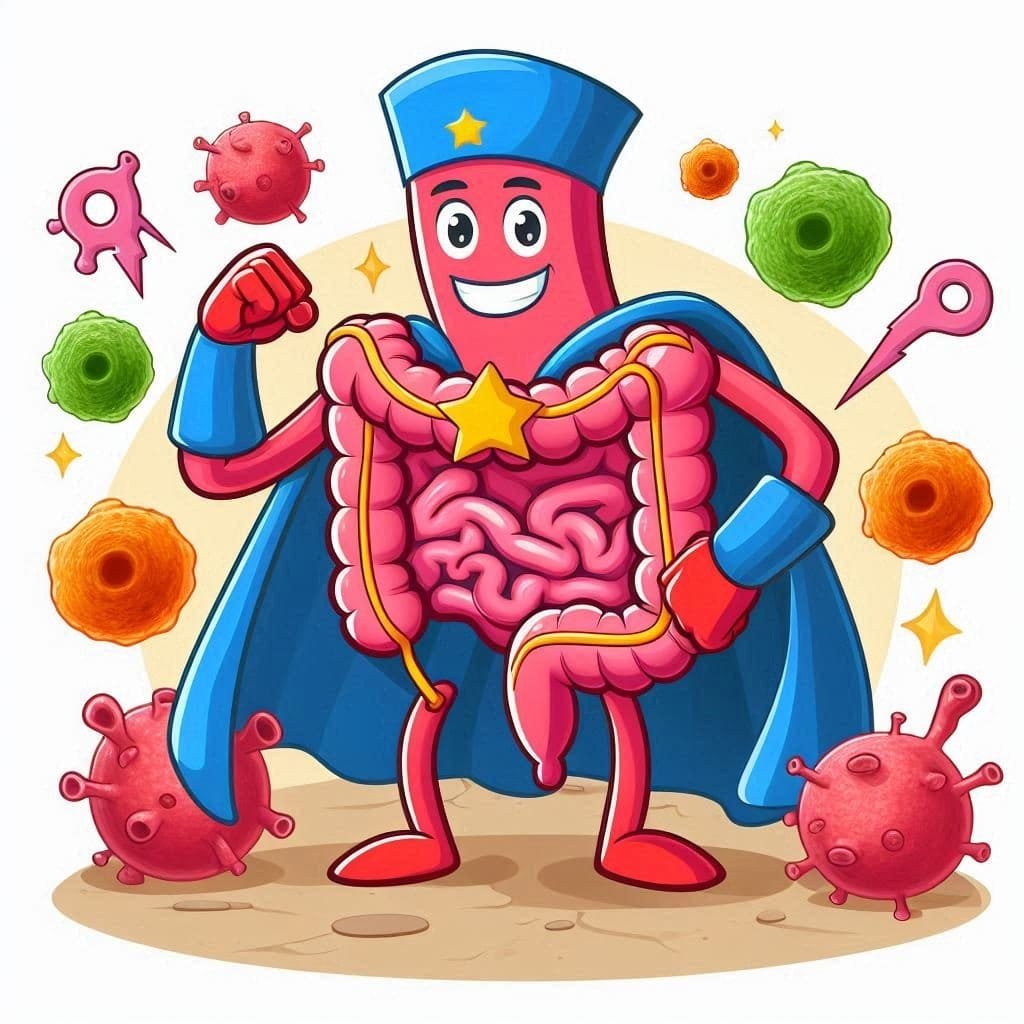Bowel Cancer
Depending on when we reflect on our health, more often than not it is to consider the risk of getting a heart disease, diabetes, or getting the flu. Yet, there’s a quiet executioner that merits our consideration: THE ROLE OF FIBRE IN BOWEL CANCER. More commonly referred to as colon cancer or colorectal cancer, this disease affects millions globally, but most of us are still not very much acquainted with it.
In this article, we will dive headfirst into the world of bowel cancer, learning its causes, symptoms, treatments, as well as prevention measures. In due course, you will have a better understanding of this complex ailment and ways in which you can protect yourself and your loved ones.

Bowel cancer is one of the most acknowledged diseases not only in Nigeria but in the whole world, affecting all categories of people. It develops in the internal organ or colon or rectum and often grows slowly for more than a while. The reason bowel cancer is especially dangerous is because it can occur and go unnoticed, especially during its early stages where there are no manifestations of the disease. That is the reason mindfulness and normal screening are so urgent in the battle against this sickness.
Reasons for Bowel Cancer
It is, therefore, relatively complicated to understand what causes bowel cancer, although there is scientific knowledge of how it occurs in the body. While specialists haven’t pinpointed a solitary, conclusive reason, they’ve recognized a few gamble factors that can expand your possibilities fostering this illness:
Age:
Amply, it can be seen that as we age, along with the risk of bowel cancer we take. More often, it occurs in those who are over 50, yet it is possible in younger people as well.
Family history:
If your direct relative has been diagnosed with bowel cancer, then your risk is elevated. This could be because of acquired qualities or way of life variables that are spoken to in natives.
Diet:
A diet inclining towards red and handled meats and low in fiber has been credited to bowel cancer. It is like feeding some substandard fuel to your body’s engine.
Lack of actual work:
Laid back people out there, beware!!! A couch potato kind of life increases your chances of getting bowel cancer. Time is now, so let’s start!
Obesity:
For instance, taking more weight, or extra weight around the waist, is likely to increase your risk. Regard it as an extra for which your body can easily do without.
Smoking and liquor:
These undesirable propensities could increase the improvement of bowel cancer. It looks like inviting trouble as a guest into your system; there is no better way to describe it.
Inflammatory inside illnesses:
Hawaii, like Crohn’s infection or ulcerative colitis, can increase your hazard after some time.
Polyps: These little developments in the colon or rectum can once in a while form into malignant growth whenever left untreated.
It is more of a way of piling the opportunities. Fortunately, a large number of these elements are within this control, and hence we can reduce the risks that surround any chance we take.

As for any other treatments, there are several side effects of bowel cancer:
Bowels cancers diagnosed early enough will enhance the situation considerably in terms of the treatment outcomes. However, at the early stages, this silent disease is known to have no symptoms or signs that may be easily identified. For that reason, it becomes important that one learns about expected advance notice signs and does not dismiss them. Here are a few side effects to look out for:
Changes in gut propensities:
When you observe constant and persistent alterations in your fecal matter, such as diarrhea, constipation, or even the pattern of your stool, then you need to pay attention.
Blood in the stool:
This can actually present as bright red blood or give a feces more the appearance of being very grey or lacking color. Do not think it is only piles; you should go for a checkup.
Abdominal torment or distress:
Stomach pain signals, gas, or burning sensations in your intestines could be indicative of bowel cancer.
Unexplained weight reduction:
Unless you are intentionally undergoing a weight loss program, if you start losing weight, often without doing any activity, it may be a sign.
Fatigue and shortcoming:
Always feeling tired or weak may be as a result of paleness due to draining from a growth.
Feeling like your gut doesn’t void totally: This sensation even after you can go to the bathroom might be a side effect of the same.
Narrow stools:
This is because if you find that the stools that you have are consistently less wide than they should be, then it might be advisable that you seek the help of a doctor.
What is important to understand, though, is that these side effects can also be triggered by other, albeit less demanding, situations. However, if you are experiencing any of them on a daily basis, seeing your doctor is recommended. In as much as bowel cancer is concerned, it is better to be safe than sorry.
Treatment for Bowel Cancer
If you have been diagnosed with bowel cancer, recall that the treatments have advanced significantly. The manner in which acing this sickness can be managed is a pathology approach, which is considered an individualized treatment plan for the person. Here is an outline of the primary treatment choices:
Surgery:
This is many times the principal line of defense against bowel cancer. Doctors ensure that they deal with the growth and the forming of a round, solid structure that contains all disease cells. At times, they may have to remove sections of the colon or rectum.
Chemotherapy:
Think of this in the light of sending in the rangers. Chemotherapy is used in the form of potent drugs to eliminate the tumor cells in all parts of the body. They are normally inferred to be used after a surgery to clean up the residual disease organisms or to shrink down cancers prior to surgery.
Radiation treatment:
This therapy uses light beams to destroy diseases. This therapy is also called radiation therapy. It looks and sounds like accuracy bombardment, attacking the disease whilst sparing healthy tissue. There are several patients who have been treated with it for rectal illness.
Immunotherapy:
Such a modern type of therapy makes use of its own strong organism to fight the disease. Well, it reminds me of forming the military of the body ready for what is awaiting it to persecute the enemy.
Counteraction of Bowel Cancer
So although it must be conceded that we can never eradicate the gamble of bowel cancer altogether, there are numerous things we could do to enhance our likelihood. Anti-action is somewhat like constructing a post to shield one’s well-being. Here are a few methodologies to assist with diminishing your gamble:
Eat a solid eating routine.
They should consume more organic products, vegetables, and whole grains. The food varieties you will be helping yourself with underneath are wealthy in fiber and cell reinforcements, which help in defending the colon. Consumption of red and handled meats should be reduced, as these have been associated with an increased tendency for bowel cancer.
Stay dynamic:
Low-risk jobs can help to reduce your risk from active work or through. Don’t be too protective; 30 minutes of moderate-intensity exercise most of the week. It is something that looks like giving your body a day-to-day shift from one part of the body to another in positioning and pressure.
Maintain a solid weight:
Overweight is a risk factor for bowel cancer; therefore, it is more than important that one should not exceed the recommended weight. Perhaps you should not even look at it as straining your body’s frameworks too much.
Limit liquor and quit smoking.
Both of these propensities can increase your chance of bowel cancer. Through and through scaling back or stopping is a powerful approach for protecting your well-being.
Get screened routinely:
A normal screening to get bowel cancer can detect it during its early and general stages, hence manageable. This is like having a checkup on your car and having problems fixed before they escalate.
Consider headache medicine:
Some checks suggest that non-selective utilization of ibuprofen might help in reducing bowel cancer occurrence. However, first, speak to your primary care physician since, in a certain sense, ibuprofen has side effects.
Manage provocative entrail illnesses:
It is, however, important to put into consideration conditions such as Crohn’s disease or ulcerative colitis; consult your doctor to manage them.
Know your family ancestry:
You may thus need prior or further screening if bowel cancer is common in your family. We are blinded into being even more cautious, assuming we know that we are at a higher risk.
Remember, counteraction is a cycle that is ongoing. Regarding the kind of life choices you keep making, they should enhance your well-being and decrease your risk of bowel cancer.

Conclusions
Bowel cancer is a disease that we need to be very worried about, but then again, it is an infection that we can effectively fight. It is easier to face this test when you understand what leads to it, when you can see its side effects, and when you know your options when it comes to treatment. More importantly, since it only takes whatever it may to prevent bowel cancer, we can minimize our odds and even protect our health.
It is therefore advisable to arm ourselves with as much information as possible concerning bowel cancer. Do not waste any time at all discussing it with your friends and family and medical services suppliers. Routine preventative exams and tests should not be ignored, especially as we grow older or if we have some kind of precursor.
FAQs:
Is bowel cancer synonymous with colonic disease or colorectal disease?
In fact, bowel cancer and colorectal malignant tumor both refer to the same illness. The two terms are mostly used interchangeably, with bowel cancer being used more often in some countries and colorectal disease in others.
Is bowel cancer possible with the young generation?
Bowel cancer is more normal in seniority dependent individuals; however, it can influence more youthful individuals too. Recently there has been an increment in the number of bowel cancer incidences among rather young people, hence the need to sensitize and encourage early detection at any age.



